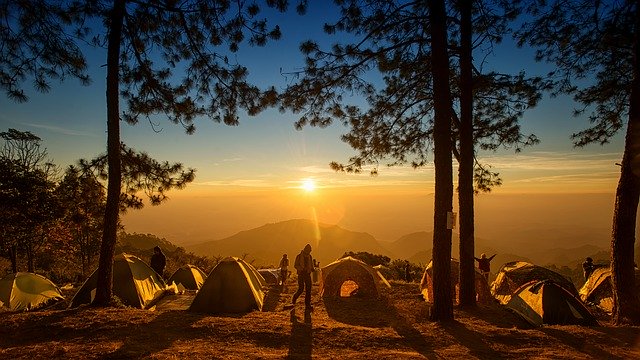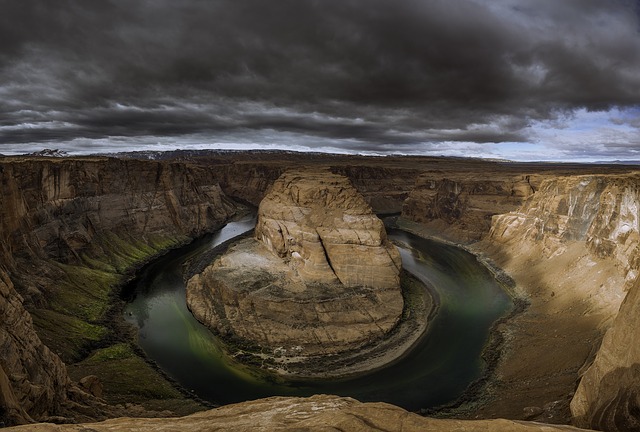When headed for a weekend outdoors, camping safety should be one of your main concerns.
Many times, when we’re camping we don’t have the same convenient access to cell phone service and it might be a far drive from the nearest hospital if something were to go wrong.
10 Camping Safety Tips To Know

Since many of the things we do while camping are things we don’t normally do at home. It’s for the reason, you should be extra cautious to make sure you stay safe and have fun. Following these 10 key safety tips will help you have an enjoyable camping trip every time.
1. First Aid Kit
Before you even leave home, make sure your first aid kit is properly stocked. You should be able to treat minor injuries like cuts, scrapes, and burns. Should someone have a serious injury a well-stocked kit might also buy you some time until the person injured receives professional care.
Some key items to make sure you have include Benadryl, Ibuprofen, Band-Aids, Neosporin, gauze, and medical tape and individual rubbing alcohol wipes.
2. Put Your Fire Out Completely
Every time you start a campfire you need to make sure it is completely extinguished before you leave it. The careless act of not properly extinguishing a fire could have serious consequences not just for you, but also the surrounding campgrounds.
The last thing you want is to wake up in the middle of the night to find your campfire is now burning outside the ring and your tent is now at risk of melting or worse burning nearby shrubbery. While this may seem far-fetched, it’s actually not, so make sure you pour plenty of water over it and then mix in soil and stir the embers until everything is wet and cool to the touch.

3. Properly Chop Firewood
While this should go without saying, it’s surprising how many people don’t properly chop firewood at their campsites. When chopping firewood, DO NOT hold the piece of wood you are trying to split.
Instead, rest the wood on a stable, flat surface such as a flat rock or another piece of wood. If the firewood is standing upright on a flat surface, the force when you swing the ax will split the wood before you knock it over.
4. Clean Up And Put Away All Food And Trash
This is especially important if you are camping in bear country, but also important to help keep various other types of scavengers away. If you have a vehicle with you while camping, make sure all food and trash get locked in the car before you go to sleep. When in bear country, many campgrounds provide campers with bear boxes that must be used to store food and or trash.
In the case that you may be backpacking through backcountry areas or for some reason you can’t store your food and trash in a car or bear box, you must hang your food and trash from in a tree.
To properly do this, choose a tree at least 200 feet from you and other campsites and make sure that the bag is at least 12 feet off the ground and 6 feet away from the tree trunk.

5. Keep Your Distance From Wildlife
One thing everyone always hopes to see while camping is wildlife, but from a safe distance, of course. It’s surprising how many people forget that you are in their home, not the other way around.
READ MORE: 5 Essential First Time Camping Tips
Once you decide where you are going to camp, figure out what kind of wildlife you may encounter and what is the distance you should keep and what you need do should you have an unexpected close encounter. Some of the dangerous wildlife you may encounter include bears, moose, mountain lions, alligators, poisonous snakes, and wolves.
6. Burns
For some reason, people always seem more likely to burn themselves while camping. Most of the time they’re minor burns, but some times it can be pretty serious. Most people quickly get comfortable and complacent hanging out late around the fire or forget to bring tongs or oven mitts to handle hot objects.
Burns are definitely something that can be easily avoided if you bring the proper tools for handling hot objects. Remember to pack an oven mitt or even better, a fireproof mitt and a set of long tongs, so that you can grab hot items off the fire.
7. Bring Camp Shoes
When packing your clothes and shoes, always remember to pack a pair of breathable and comfortable shoes, so that you ditch the hiking boots at the end of the day. Having a pair of camp shoes not only gives you something to easily slip in and out of while around camp, but also gives your feet a rest from your boots.
The last thing you want to is walk around barefooted. Though most people do their best to keep their camping areas clean and free of debris, there are often pieces of broken glass and rusty nails around campgrounds. Stepping on one of these items and cutting your foot could be a trip ender.
8. Watch The Weather

Before you head out on your trip, know what the weather is expected to be like for the days you’ll be traveling. You don’t want to get caught in an exposed area during a thunderstorm.
Always remember to choose a campsite that is sheltered and protected in case storms do roll through. If you have plans to hike a mountain or areas of high elevation, try to get out and summit early to reduce any risk of being caught in an afternoon thunderstorm.
9. Sun Protection
When spending time outdoors it can sometimes be difficult to escape the sun. Make sure to bring a hat, protective clothing, sunglasses, and sunscreen to help prevent serious sunburns, as well as, from becoming dehydrated.
You will not be comfortable for the remainder of your trip if you get badly sunburned on the first day out camping. It’s one of the biggest mistakes most people make when hiking and camping, just remember that just because it’s overcast or the sun isn’t out you’re still outside and can get sunburned.
10. Always Make Sure To Have Extra Water
Make sure to bring with you more water than you think you’ll need. It is important to stay hydrated while camping and hiking. If you aren’t completely certain whether the area you’ll be camping or hiking in has potable water, you bring plenty of water with you.
Outdoor stores and Walmart sell seven-gallon refillable water containers so you never have to worry about running out of water while spending time in the outdoors.
You may also need the extra water for putting out campfires if you’re on a multi-day hike or backcountry hiking.
What camping safety tips can you recommend for first-timers?